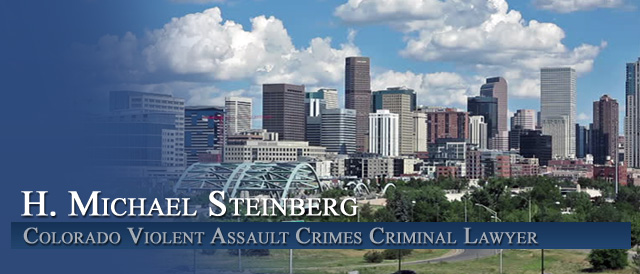





Colorado Assaults On Police Officers – Dangerous Laws 18-3-203 & 18-3-204
By H. Michael Steinberg Colorado Violent Crimes Criminal Defense Lawyer
Colorado Assaults On Police Officers – Dangerous Laws 18-3-203 & 18-3-204 – There are classes of alleged victims under Colorado criminal law that are accorded “special protections.” Among these classes are police officers (or sheriff deputy, firefighter, a district attorney, judge, or other officer of the court or the judicial system). These special categories enhance the punishment if a member of this “protected class” of individuals is assaulted in Colorado.
There Are Two Defined Crimes For Criminal Prosecution Of Assaults On Police Officers
There are two defined crimes for the offenses of Colorado assaults on police officers. One is a misdemeanor – the other a very serious felony.
The Colorado Misdemeanor Crime Of Third Degree Assault On A Peace Officer – 18-3-204 and 18-1.3-501
Summary Of the Law
Under CRS 13-3-204 – Third degree assault requires that a person knowingly or recklessly cause bodily injury (some form of pain). If a person is charged with assaulting a “peace officer” engaged in the performance of his or her lawful duties, that fact enhances (increases) the length of the sentence county jail of at least 2 years and 1 day up to four years. Probation is not an option.
What follows is the law as of 2016:
18-3-204 Assault in the Third Degree
(1) A person commits the crime of assault in the third degree if:
(a) The person knowingly or recklessly causes bodily injury to another person or with criminal negligence the person causes bodily injury to another person by means of a deadly weapon; or
(b) The person, with intent to harass, annoy, threaten, or alarm another person whom the actor knows or reasonably should know to be a peace officer, a firefighter, an emergency medical care provider, or an emergency medical service provider, causes the other person to come into contact with blood, seminal fluid, urine, feces, saliva, mucus, vomit, or toxic, caustic, or hazardous material by any means, including throwing, tossing, or expelling the fluid or material.
…
(3) Assault in the third degree is a class 1 misdemeanor and is an extraordinary risk crime that is subject to the modified sentencing range specified in section 18-1.3-501(3).
…
The Colorado Felony Crime of Assault In The Second Degree On A Peace Officer CRS 18-3-203
Summary Of the Law
This law is much more complex and the consequences are much more serious. It is best understood by breaking out the elements of the law:
The Elements Of The Colorado Felony Crime Of Second Degree Assault On A Police Officer – 18-3-203
Here is the crime broken into its elements:
Assault in the Second Degree (Peace Officer, Firefighter, or Emergency Medical Service Provider)
The elements of the crime of assault in the second degree (peace officer, firefighter, or emergency medical service provider) are:
1. That the defendant,
2. in the State of Colorado, at or about the date and place charged,
3. with intent,
4. to prevent a person whom he [she] knew, or should have known, to be a peace officer, firefighter, or emergency medical service provider from performing a lawful duty,
5. intentionally,
6. caused bodily injury to any person.
7. and that the defendant’s conduct was not legally authorized by an affirmative defense.
Here is a reprint of the entire law with relevant sections designated in bold and italics.
§ 18-3-203. Assault in the Second Degree
(1) A person commits the crime of assault in the second degree if:
…
(b) With intent to cause bodily injury to another person, he or she causes such injury to any person by means of a deadly weapon; or
(c) With intent to prevent one whom he or she knows, or should know, to be a peace officer, firefighter, emergency medical care provider, or emergency medical service provider from performing a lawful duty, he or she intentionally causes bodily injury to any person; or
(c.5) With intent to prevent one whom he or she knows, or should know, to be a peace officer, firefighter, or emergency medical service provider from performing a lawful duty, he or she intentionally causes serious bodily injury to any person; or
(d) He recklessly causes serious bodily injury to another person by means of a deadly weapon; or
(e) For a purpose other than lawful medical or therapeutic treatment, he intentionally causes stupor, unconsciousness, or other physical or mental impairment or injury to another person by administering to him, without his consent, a drug, substance, or preparation capable of producing the intended harm; or
(f) While lawfully confined or in custody, he or she knowingly and violently applies physical force against the person of a peace officer, firefighter, or emergency medical service provider engaged in the performance of his or her duties, or a judge of a court of competent jurisdiction, or an officer of said court, or, while lawfully confined or in custody as a result of being charged with or convicted of a crime or as a result of being charged as a delinquent child or adjudicated as a delinquent child, he or she knowingly and violently applies physical force against a person engaged in the performance of his or her duties while employed by or under contract with a detention facility, as defined in section 18-8-203(3), or while employed by the division in the department of human services responsible for youth services and who is a youth services counselor or is in the youth services worker classification series, and the person committing the offense knows or reasonably should know that the victim is a peace officer, firefighter, or emergency medical service provider engaged in the performance of his or her duties, or a judge of a court of competent jurisdiction, or an officer of said court, or a person engaged in the performance of his or her duties while employed by or under contract with a detention facility or while employed by the division in the department of human services responsible for youth services.
A sentence imposed pursuant to this paragraph (f) shall be served in the department of corrections and shall run consecutively with any sentences being served by the offender; except that, if the offense is committed against a person employed by the division in the department of human services responsible for youth services, the court may grant probation or a suspended sentence in whole or in part, and the sentence may run concurrently or consecutively with any sentences being served. A person who participates in a work release program, a furlough, or any other similar authorized supervised or unsupervised absence from a detention facility, as defined in section 18-8-203(3), and who is required to report back to the detention facility at a specified time is deemed to be in custody.
(f.5) (I) While lawfully confined in a detention facility within this state, a person with intent to infect, injure, harm, harass, annoy, threaten, or alarm a person in a detention facility whom the actor knows or reasonably should know to be an employee of a detention facility, causes such employee to come into contact with blood, seminal fluid, urine, feces, saliva, mucus, vomit, or any toxic, caustic, or hazardous material by any means, including but not limited to throwing, tossing, or expelling such fluid or material.
…
(III) (A) As used in this paragraph (f.5), “detention facility” means any building, structure, enclosure, vehicle, institution, or place, whether permanent or temporary, fixed or mobile, where persons are or may be lawfully held in custody or confinement under the authority of the state of Colorado or any political subdivision of the state of Colorado.
(B) As used in this paragraph (f.5), “employee of a detention facility” includes employees of the department of corrections, employees of any agency or person operating a detention facility, law enforcement personnel, and any other persons who are present in or in the vicinity of a detention facility and are performing services for a detention facility. “Employee of a detention facility” does not include a person lawfully confined in a detention facility.
(g) With intent to cause bodily injury to another person, he or she causes serious bodily injury to that person or another; or
(h) With intent to infect, injure, or harm another person whom the actor knows or reasonably should know to be engaged in the performance of his or her duties as a peace officer, a firefighter, an emergency medical care provider, or an emergency medical service provider, he or she causes such person to come into contact with blood, seminal fluid, urine, feces, saliva, mucus, vomit, or any toxic, caustic, or hazardous material by any means, including by throwing, tossing, or expelling such fluid or material; or
(i) With the intent to cause bodily injury, he or she applies sufficient pressure to impede or restrict the breathing or circulation of the blood of another person by applying such pressure to the neck or by blocking the nose or mouth of the other person and thereby causes bodily injury.
(2) (a) If assault in the second degree is committed under circumstances where the act causing the injury is performed upon a sudden heat of passion, caused by a serious and highly provoking act of the intended victim, affecting the person causing the injury sufficiently to excite an irresistible passion in a reasonable person, and without an interval between the provocation and the injury sufficient for the voice of reason and humanity to be heard, it is a class 6 felony.
(b) If assault in the second degree is committed without the circumstances provided in paragraph (a) of this subsection (2), it is a class 4 felony.
(b.5) Assault in the second degree by any person under subsection (1) of this section without the circumstances provided in paragraph (a) of this subsection (2) is a class 3 felony if the person who is assaulted, other than a participant in the crime, suffered serious bodily injury during the commission or attempted commission of or flight from the commission or attempted commission of murder, robbery, arson, burglary, escape, kidnapping in the first degree, sexual assault, sexual assault in the first or second degree as such offenses existed prior to July 1, 2000, or class 3 felony sexual assault on a child.
(c) (I) If a defendant is convicted of assault in the second degree pursuant to paragraph (c.5) of subsection (1) of this section or paragraph (b.5) of this subsection (2), except with respect to sexual assault or sexual assault in the first degree as it existed prior to July 1, 2000, the court shall sentence the defendant in accordance with the provisions of section 18-1.3-406 . A defendant convicted of assault in the second degree pursuant to paragraph (b.5) of this subsection (2) with respect to sexual assault or sexual assault in the first degree as it existed prior to July 1, 2000, shall be sentenced in accordance with section 18-1.3-401(8) (e) or (8) (e.5).
(II) If a defendant is convicted of assault in the second degree pursuant to paragraph (b), (c), (d), or (g), of subsection (1) of this section, the court shall sentence the offender in accordance with section 18-1.3-406 ; except that, notwithstanding the provisions of section 18-1.3-406 , the court is not required to sentence the defendant to the department of corrections for a mandatory term of incarceration.
[HMS – Note – As a result of new legislation – Judges in Colorado are no longer required to sentence ALL persons convicted of Second Degree Assault to prison. (See the red notations above). This change – restoring discretion to Colorado Judges at sentencing is a major change in the law and as of July 1, 2016 applies to the designated sections which include Second Degreee Assault On A Police Officer]
Was This Alleged Felony Assault On A Colorado Police Officer Actually Just The Misdemeanor of Resisting Arrest?
Another Colorado Law – Resisting Arrest – Section 18-8-103(1), provides:
A person commits resisting arrest if he knowingly prevents or attempts to prevent a peace officer, acting under color of his official authority, from effecting an arrest of the actor or another, by:
(a) Using or threatening to use physical force or violence against the peace officer or another; or
(b) Using any other means which creates a substantial risk of causing bodily injury to the peace officer or another.
Now, let’s compare the Second Degree Assault as a felony crime to this Resisting Arrest misdemeanor:
CRS Section 18-3-203(1)(f) provides in pertinent part that a person commits second degree assault if “[w]hile lawfully confined or in custody, he or she knowingly and violently applies physical force against the person of a peace officer … engaged in the performance of his or her duties.”
The Colorado Supreme Court has held that an arrest must precede the person being “in custody” for purposes of § 18-3-203(1)(f). Therefore if a Defendant is charged with resisting arrest and second degree assault:
…both statutes could be violated only if the defendant’s conduct began Before the arrest and resumed after it.
A citizen using violence against a police officer to avoid arrest commits the crime of resisting arrest up to the point of arrest. BUT, after the arrest has occurred and that person is now in custody, if the arrestee uses violence against a police officer the crime is now second degree assault.
“[t]he two crimes are mutually exclusive, and whether the defendant’s use of force precedes or follows the effectuation of the arrest dictates the nature of the offense.”
When Does An Arrest Occur – When Is The Defendant “In Custody?”
An arrest occurs when, in view of all the circumstances, a reasonable person would believe that he or she is not free to leave.
“Custody” means “the restraint of a person’s freedom in any significant way.” Section 16-1-104(9)..
What follows is the Colorado Crime of Resisting Arrest:
CRS Section 18-8-103 Resisting arrest
(1) A person commits resisting arrest if he knowingly prevents or attempts to prevent a peace officer, acting under color of his official authority, from effecting an arrest of the actor or another, by:
(a) Using or threatening to use physical force or violence against the peace officer or another; or
(b) Using any other means which creates a substantial risk of causing bodily injury to the peace officer or another.
(2) It is no defense to a prosecution under this section that the peace officer was attempting to make an arrest which in fact was unlawful, if he was acting under color of his official authority, and in attempting to make the arrest he was not resorting to unreasonable or excessive force giving rise to the right of self-defense. A peace officer acts “under color of his official authority” when, in the regular course of assigned duties, he is called upon to make, and does make, a judgment in good faith based upon surrounding facts and circumstances that an arrest should be made by him.
(3) The term “peace officer” as used in this section and section 18-8-104 means a peace officer in uniform or, if out of uniform, one who has identified himself by exhibiting his credentials as such peace officer to the person whose arrest is attempted.
(4) Resisting arrest is a class 2 misdemeanor.
Understanding The “Defense” Of Asserting The Lesser Crime Of Resisting Arrest
When a Defendant is facing a conviction for either resisting arrest and second degree assault, one of the critical factors is whether the actions of the Defendant, which caused the injury to the officers, were:
…continuous, stemming from his efforts to resist arrest, or whether there was a break between his actions to thwart the officers efforts to arrest him and the actions which lead to the injury of the officers.
So, to summarize, a person using violence against a police officer to avoid arrest commits the crime of resisting arrest up to the point of arrest – but after the arrest is made, a person in custody who uses violence against a peace officer will probably be charged with committing second degree assault under §18-3-203.
Colorado Assaults On Police Officers – Dangerous Laws 18-3-203 & 18-3-204
If you found any of the information I have provided on this web page article helpful please click my Plus+1 or the Share buttons for Twitter and Facebook below so that others may also find it.
If, after reading this article, you have questions about your case and would like to consider retaining our law firm, we invite you to contact us at the Steinberg Colorado Criminal Defense Law Firm – 303-627-7777.
Never stop fighting – never stop believing in yourself and your right to due process of law. You will not be alone in court, H. Michael at your side every step of the way – advocating for justice and the best possible result in your case.
 ABOUT THE AUTHOR: H. Michael Steinberg – Email The Author at [email protected] – A Denver Colorado Criminal Defense Lawyer – or call his office at 303-627-7777 during business hours – or call his cell if you cannot wait and need his immediate assistance – 720-220-2277. Attorney H. Michael Steinberg is passionate about criminal defense. His extensive knowledge and experience of Colorado Criminal Law gives him the edge you need to properly handle your case.
ABOUT THE AUTHOR: H. Michael Steinberg – Email The Author at [email protected] – A Denver Colorado Criminal Defense Lawyer – or call his office at 303-627-7777 during business hours – or call his cell if you cannot wait and need his immediate assistance – 720-220-2277. Attorney H. Michael Steinberg is passionate about criminal defense. His extensive knowledge and experience of Colorado Criminal Law gives him the edge you need to properly handle your case.
“A good criminal defense lawyer is someone who devotes themselves to their client’s case from beginning to end, always realizing that this case is the most important thing in that client’s life.”
You should be careful to make a responsible choice in selecting a Colorado Criminal Defense Lawyer – and we encourage you to “vet” our firm. Over the last 30 plus years – by focusing ONLY on Colorado criminal law – H. Michael has had the necessary time to commit to the task of constantly updating himself on nearly every area of criminal law, to include Colorado criminal law and procedure and trial and courtroom practice. H. Michael works hard to get his clients the best possible results in and out of the courtroom. He has written, and continues to write, extensively on Colorado criminal law and he hopes this article helps you in some small way – Colorado Assaults On Police Officers – Dangerous Laws 18-3-203 & 18-3-204.

Other Articles of Interest:
- Colorado Criminal Law – The Law Of “Fresh Pursuit” – Can The Police Chase You Into Another County Or State?
- Can I Obtain A Colorado Police Officer’s Records? – The Law
- The Police Cannot Create Their Own Exigent (Emergency) Circumstance To Violate Your Rights In Colorado
- Attorney Profile
- Colorado Violent Crimes – A Time For Strategy – A Time For Experience













